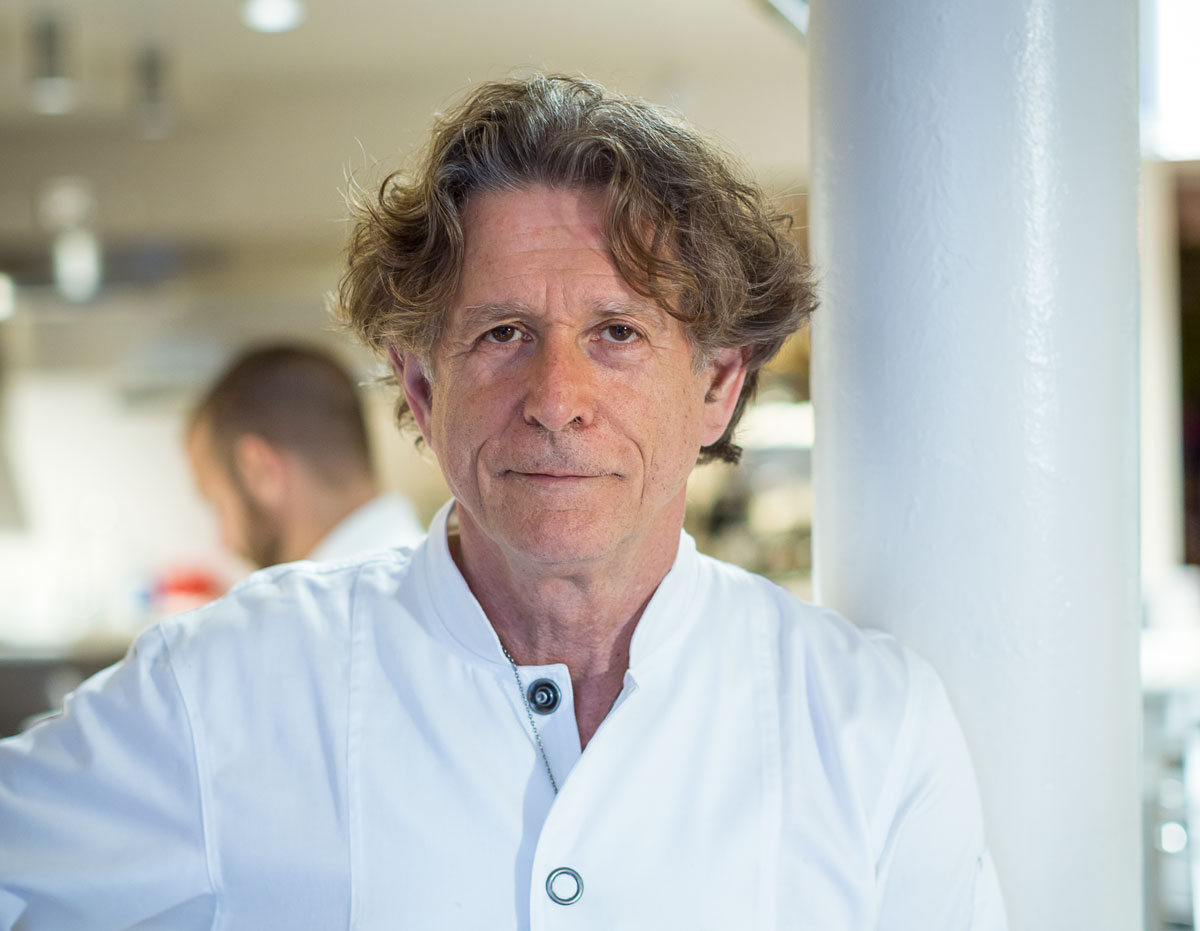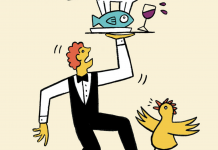
Photograph courtesy of Gunter Seeger NYC
Born in Germany’s Black Forest to a family of produce brokers, chef Günter Seeger helped put Atlanta on the global gourmet map when he arrived at the Ritz-Carlton Buckhead in 1986, a European Michelin star already in hand. In 1997, he opened his jewel-box restaurant, Seeger’s, which garnered an international reputation for its luxe, creative dishes in the decade it operated from West Paces Ferry Road.
Before Seeger’s, farm-to-table dining didn’t truly exist here. Chefs didn’t have special relationships with growers and producers; they didn’t focus on organic sources, and no one has come close to the stunning clarity of his often deceptively simple-looking dishes. While Seeger has spent the past decade in New York (operating an even more progressive eponymous restaurant from 2007 to 2009 that earned him another Michelin star before shifting gears to consulting), he recently announced a move back to Atlanta, in part due to the COVID-19 pandemic. Seeger is planning to open a revolutionary restaurant concept designed for a new world. As he recently told the AJC, “it can’t just be a restaurant anymore. . . . It has to be a multi-level experience.”
He returns to a very different city, one that embraces the practices he always embodied: the importance of local, organic produce and creating food that simultaneously delights the senses and nurtures the body. Seeger, who just turned 70, will be an elder statesman in a sea of young chefs—a scene full of great ideas but with few mentorship opportunities. Unlike embattled New York, which he describes as “Chernobyl,” Atlanta is a place more ready and able to accept new ways of doing business.
Below, Seeger discusses his decision to leave New York, the future of restaurants, and his resurrected role as an Atlanta chef.
It’s certainly a surprise that you’re coming back to Atlanta after more than a decade in New York. What factored into that decision?
We originally came down to celebrate [our daughter] Alessandra’s birthday with the grandparents. [Seeger’s wife, Leslie, is from Atlanta.] But then things started to get bad [in New York with the COVID-19 pandemic], we thought, Let’s stay a little bit longer here and see what happens. Then, things got really bad. I was working on a big project—overseeing culinary amenities for a new building owned by the Trinity Church [in Manhattan]—but the church decided to postpone the project for almost a year.
This is a very serious place we’re in. It’s not going to be business as usual [as the pandemic ends], and I think we have to be open to that. It’s just like how September 11 changed the world of traveling. It will never go back to where it was.
Looking at that, and as much as I love New York, I also have two young children [Alessandra, 8, and Katarina, 2]. And visiting Atlanta [reminded me] that as exciting as New York is, you compromise a lot. Seeing all the beautiful trees here again, it was like, wow. It’s amazing. It will also be a much better place to raise our children.
I will always do something food related, but it doesn’t need to necessarily be a small restaurant. A brick-and-mortar restaurant, in my opinion, is not a good business model anymore. It needs to be designed around the new world after.
What is the situation like in New York right now?
Everybody has jumped in now to help feed people, because there is really a need for that, but I don’t think anybody has a real plan for [what comes next]. What will be so hard for these restaurants in New York is when, economically, you’re already stretched to the limit because of the [high cost of doing business]. Then the health departments will have new restrictions. Can we go back to 100 percent—or at least 80 percent—occupancy? That’s not going to happen for a long time. I think restaurants have to look for some alternatives.
I’m totally for reopening the [economic] markets. We can’t just close ourselves up for six months. The outcome would be worse than the epidemic we’re living with. I think we have to be very careful about that and be very responsible, but it definitely will change the world.
I would imagine that 50 percent of all restaurants will not re-open. There’s just not enough income, and the costs are too high. This is going to be quite a challenge. On the other hand, it will create new opportunities.
The farm-to-table scene here has increased dramatically since you left. The Atlanta that you are re-entering is kind of your dream Atlanta.
I have a lot of the national resources [for getting fresh produce in New York], but I also went four times a week to the Union Square Market, basically picking everything for the restaurant myself. There are some really good people, but it has become very commercially driven, and, of course, it’s very difficult for these farmers because some have to drive four or five hours just to come to the market. How pristine our products are in Atlanta, there is no comparison. I’m super excited about this, because I still know most of these people, and I think we can continuously to work with them and also market and use their [produce].
Atlanta is filled with young chefs. As someone who has been in the restaurant industry for five decades, what do you see as your role?
What I’d really like to do is get a little more into understanding the [mind of Atlanta’s] young chefs, maybe participate in their world and support them in what they’re doing. Maybe this is a new era for me, too. Hopefully I can contribute something to that world in Atlanta.
Do you plan to be based in Buckhead again?
No. My restaurant in New York wasn’t on the Upper East Side, either. If you open a new business, it has to economically work. We also need to become more original and authentic. There’s just too many restaurants just from yesterday. Authenticity and originality is, for me, something exciting. That also needs a structure around it and an area around it to support that.
Beyond the pandemic, what are some of the challenges you see right now in terms of what we’re eating and how we approach food?
Cuisine has grown into almost like a Lego cuisine. It’s just too manufactured. Even in high-end restaurants, it’s like totally manufactured food. There has to be less manufacturing. We also need to get over [how visual food has become]. Why are we trying as chefs to be painters or some artists in some ways? I don’t consider myself an artist. I want to be an extension of the land and the farmer and the product. [I want to take] what comes out of the ground, beautifully grown by the farmer, and transport it in a beautiful way, keeping the essence of it. It’s still very beautiful when it’s on your plate, and you feel good. It’s [about] well-being. How do I feel after my dinner?













